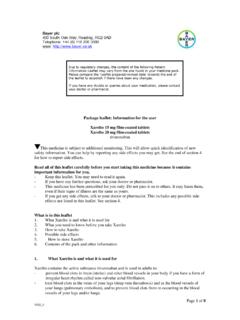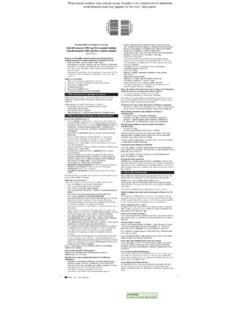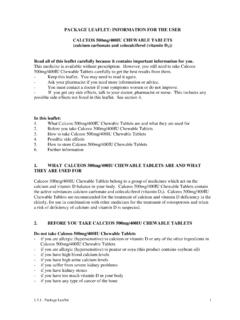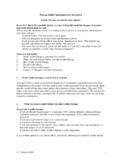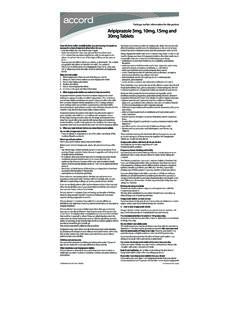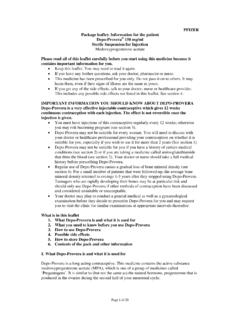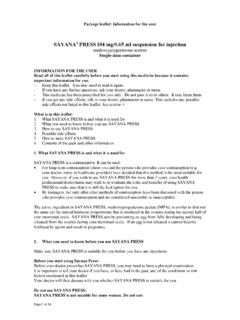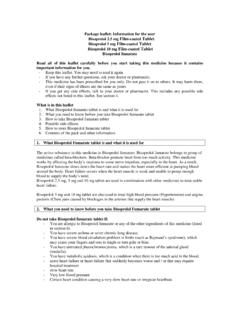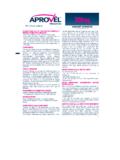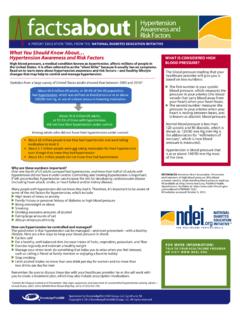Transcription of Diclofenac potassium 25mg & 50mg tablets - …
1 * Please note that only Artwork Studio is permitted to make changes to the above artwork. No changes are permitted by any 3rd party other than added notes and mark ups for required changes. approved for print/dateProof ApprovalNon Printing ColoursColoursDate sent:Date received: Item number: Originator:Origination Date:Revision Date:Revised By:Dimensions:Min Body Text Size:Supplier:1. 2. 1. FMD info NA (not a carton) No Yes DetailsDiclofenac potassium 25mg & 50mg tablets PIL - x potassium 25mg & 50mg tabletsPATIENT INFORMATION LEAFLETIn this leaflet: 1.
2 What Diclofenac potassium tablets are and what they are used for 2. Before you take Diclofenac potassium tablets 3. How to take Diclofenac potassium tablets 4. Possible side effects 5. How to store Diclofenac potassium tablets 6. Further Information 1. What Diclofenac potassium tablets are and what they are used for Diclofenac potassium belongs to a group of medicines called non-steroidal anti-inflammatory drugs (NSAIDs), which are used to reduce pain and inflammation in the following conditions: Sprains, strains and other injuries Pain and inflammation following surgery Gout Other painful conditions affecting the joints and muscles such as backache, rheumatoid arthritis, osteoarthritis, ankylosing spondylytis and pyrophosphate arthropathy.
3 The tablets can also be used to relieve the symptoms associated with migraine attacks in adults. 2. Before you take Diclofenac potassium tablets Do not take Diclofenac potassium tablets if you: are allergic (hypersensitive) to Diclofenac potassium or any of the other ingredients in the tablet (see section 6) have a peptic ulcer, in your stomach (gastric) or small intestine (duodenal) or bleeding in your stomach, or have had two or more episodes of peptic ulcers, stomach bleeding or perforation have history of gastro-intestinal bleeding or perforation, relating to previous NSAID therapy have previously had a reaction (asthma, hives or a cold) caused by an allergy to salicylates ( aspirin)
4 Or other non-steroidal pain killers suffer from severe kidney, heart or liver failure have established heart disease and /or cerebrovascular disease if you have had a heart attack, stroke, mini-stroke (TIA) or blockages to blood vessels to the heart or brain or an operation to clear or bypass blockages have or have had problems with your blood circulation (peripheral arterial disease) are pregnant, and in the last three months (last trimester) of pregnancy. Check with your doctor or pharmacist before taking Diclofenac potassium tablets if you.
5 Have a history of gastrointestinal disease ulcerative colitis or Crohn s disease have reduced heart, kidney, or liver function suffer from any blood clotting disorder have or have had asthma suffer from liver porphyria (disorder of the red blood pigment) have had or need to have surgery are elderly (over 65) are being treated with diuretics (water tablets ) or COX-2 inhibitors such as celecoxib have Systemic Lupus Erythematosus (SLE) and mixed connective tissue sure your doctor knows, before you are given Diclofenac : If you smoke If you have diabetes If you have angina, blood clots, high blood pressure, raised cholesterol or raised triglyceridesSide effects may be minimised by using the lowest effective dose for the shortest duration necessary.
6 Medicines such as Diclofenac may be associated with a small increased risk of heart attack ( myocardial infarction ) or stroke. Any risk is more likely with high doses and prolonged treatment. Do not exceed the recommended dose or duration of treatment. If you have heart problems, have had a previous stroke or think that you might be at risk of these conditions you should discuss your treatment with your doctor or pharmacist. Diclofenac may mask the signs and symptoms of you are taking these tablets , your doctor may want to give you a check-up from time to time.
7 Taking other medicines Please tell your doctor or pharmacist if you are taking or have recently taken any other medicines, including medicines obtained without a prescription. Especially: medicines to treat diabetes a dose adjustment of these medicines may be necessary as blood sugar may drop too low anticoagulants ( warfarin) - these may increase the risk of bleeding diuretics (water tablets ) the effect of these may be decreased. potassium -sparing diuretics may increase the potassium levels in the blood lithium (medicine to treat depression) the blood levels of these medicines may be increased if taken with Diclofenac cytotoxic medicines ( methotrexate to treat cancers)
8 Should not be taken less than 24 hours before or after Diclofenac potassium tablets - the blood levels of these medicines may be increased if taken with Diclofenac ciclosporin this may harm kidney function quinolones (to treat infections, ciprofloxacin and levofloxacin) these may cause convulsions (fits) steroid tablets these may increase the risk of bleeding in the stomach other NSAIDs ( aspirin) these may increase the risk of side effects medicines to treat high blood pressure (ACE-inhibitors, beta blockers) the blood pressure lowering effect may be reduced mifepristone (used to induce abortion) effect of mifepristone may be reduced by NSAIDs cardiac glycosides ( digoxin) used to treat heart failure.
9 Use with Diclofenac may worsen heart failure or increase blood levels of these medicines tacrolimus (an immunosuppressant) - these may increase the risk of kidney damage zidovudine (an antiretroviral drug used to treat HIV) - combination with Diclofenac may increase the risk of blood disorders phenytoin (a medicine used to treat seizures) - the blood level of this medicine may be increased if taken with Diclofenac colestipol and cholestyramine these may reduce the effect of Diclofenac potent CYP2C9 Inhibitors ( sulfinpyrazone and voriconazole) - the blood level of Diclofenac may be increased if taken with these medicines selective serotonin reuptake inhibitors (SSRIs) trimethoprim Laboratory tests Frequent liver and kidney function tests and monitoring of blood counts are necessary if taken for more than a few days.
10 Keep this leaflet. You may need to read it again. If you have any further questions, please ask your doctor or your pharmacist. This medicine has been prescribed for you personally and you should not pass it on to others. It may harm them, even if their symptoms are the same as yours. If you have any of the side effects, or if you notice any not listed, please tell your doctor or all of this leaflet carefully before you start taking this medicine. BBBA2023 Continued top of next columnContinued over page* Please note that only Artwork Studio is permitted to make changes to the above artwork.
